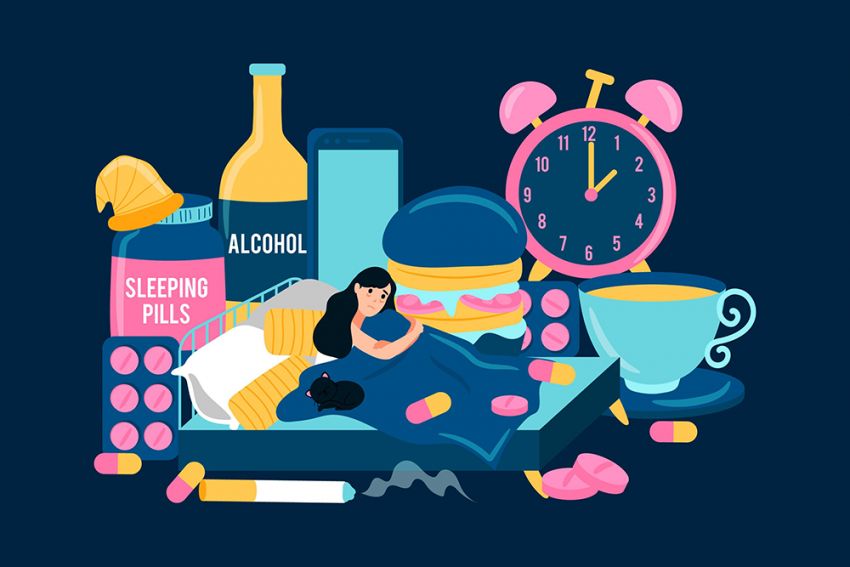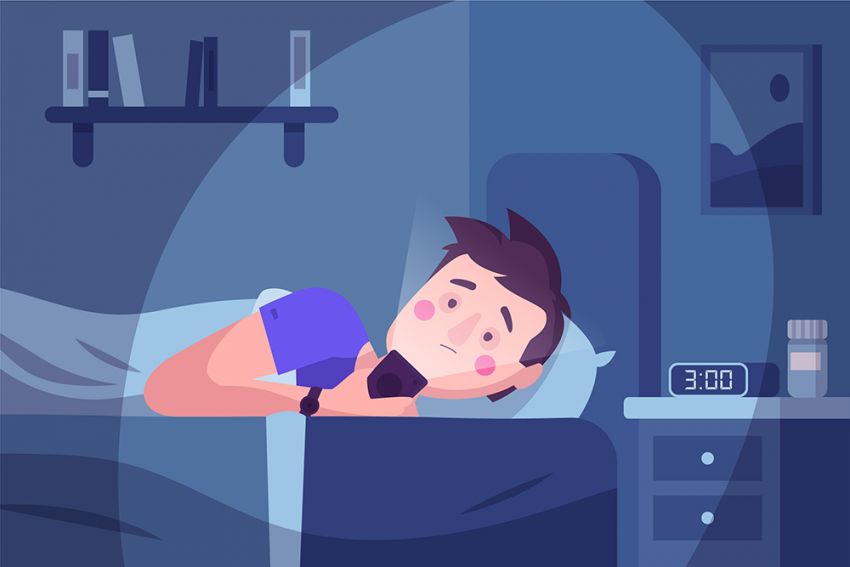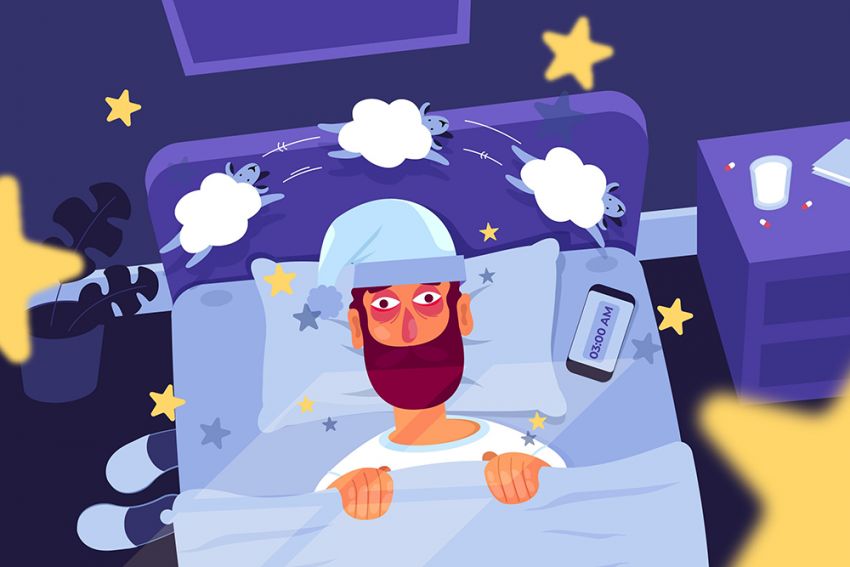Many people have insomnia, sometimes without even realizing it.
Of course, it is helpful to speak to your doctor if you’re having trouble sleeping, but if you’d rather not take medication to treat your sleep, think about making changes to your daily habits or lifestyle.
There are plenty of ways to work to reduce insomnia and stop having your sleep disrupted at night.
Unfortunately, millions of people struggle with sleep, and if you find that your mind is still on overdrive and you can’t settle down to sleep, here are some simple tips that can help you feel more relaxed and drift off without problems.
Table of Contents: Reduce Insomnia With These Simple & Effective Tips
Insomnia Tip #1: Avoid Alcohol and Caffeine
People like to wind down at night with a nightcap or sometimes have a cup of joe after dinner with dessert.
If you can avoid having alcohol or caffeine at least a few hours or more before bedtime, you will have a better time catching some zzzs.
Caffeine can stay in your system for up to eight hours and alcohol for four hours. It may depend on how much you consume, but if you want to ensure that you aren’t up all night, consider cutting back and limiting your intake.
Insomnia Tip #2: Stay On Your Sleep Routine
When you throw off your natural routine, it can also mess with your sleep schedule. Going to bed and getting up around the same time every day is the best way to avoid this problem.
If you try to sleep in or go to bed much later, it is more challenging to sleep later at night. The recommended amount of sleep for adults is a minimum of seven hours.
However, most individuals don’t need more than eight hours total for a good night’s rest. Being consistent with your sleep schedule reinforces your body’s sleep-wake cycle.

Insomnia Tip #3: Turn It Off
Devices like mobile phones, televisions, tablets, and more can cause your mind to keep processing and stop you from sleeping.
Take time to turn off all of your devices and lights before you go to bed. Cover any displays that you can’t shut off.
Insomnia Tip #4: Set Up Your Room For Sleep
Creating an environment that is made for resting will help you to find comfort and relax more easily.
For example, keep your room dark and quiet, and consider investing in room darkening shades or earplugs to help you create the ambiance you need to fall asleep.
Maybe you need a cooling bed pillow, softer sheets, or a fan on at night for some white noise in the background to make you feel more at ease.
Assess your individual needs for what helps you fall asleep and set the mood in your room.
Insomnia Tip #5: Add In Some Physical Activity
Exercise promotes better sleep, but you don’t want to be doing pushups or situps right before you go to bed since it increases your heart rate.
Instead, think about adding more physical activity into your routines, such as taking a walk outside daily or joining an exercise class at a local gym or center. But, of course, you don’t have to go to the gym to be active.
Aim to finish any of your exercises at least a few hours before going to bed.
However, if you want to engage in mind-body practices like yoga, meditation, or tai chi, you can do these closer to bedtime since they help calm you.

Insomnia Tip #6: Eat Light at Night
Big meals can cause your digestive system to do a lot of work, so if you have a big meal right before bedtime, you might stay awake because your body is working.
Overloading your digestive system will affect how well you sleep and could lead to health issues like acid reflux.
Try to finish your meals at least an hour before hitting the sack. If you want to eat o, keep evening meals to a minimum with something light.
Insomnia Tip #7: Empty Your Bladder
If you don’t empty your bladder before bed, you may find yourself waking up in the middle of the night to use the bathroom.
But don’t let this become a routine!
Bladder inconsistency can be a reason for suffering from insomnia, which occurs in close to one-third of patients who have dementia and can cause distress for patients.
Suffering from dementia with incontinence stems from the effects of the disease, including medications, behaviors, and mood disorders.
Insomnia Tip #8: Get a Massage
Maybe you need help relaxing.
Consider investing in a spa treatment, acupuncture, or massage. Things that you can add to your day to provide self-care and help you relax will go a long way to helping you feel more comfortable and ready for sleep at night.
You can’t spend every day or week going to the spa as it can be expensive.
But, think about incorporating it as part of your month, or even every other month, so that you can ensure you are giving yourself the opportunity for relaxation and comfort.

Insomnia Tip #9: Skip The Naps
Naps aren’t necessarily bad; however, you should keep your naps to a minimum during the day and make sure to nap earlier in the day rather than later.
Short naps usually won’t affect nighttime sleep quality, but if you are snapping for long periods or taking naps frequently, it may be the culprit for keeping you up at night.
Insomnia Tip #10: Check Your Neck Positioning
If you wake up often with a stiff neck or find yourself doing a lot of repositioning with your head and neck because you aren’t comfortable, you might consider changing your mattress, adding pillows, or just investing in a new one.
Your pillow should support your neck when resting on your back or side, and avoid sleeping on your stomach because it twists your neck.
Good sleep considers how you position yourself to sleep so that you can be restful and not restless.
Consider consulting your doctor on your sleep position to see if you can make some helpful changes to sleep better through the night.
Conclusion
Insomnia is a serious medical condition that requires attention.
In addition, not getting enough sleep at night can affect your life in other ways, such as causing you to feel fatigued throughout the day and miss out on essential matters.
If you’re not getting enough sleep at night, consider instilling some of these simple yet effective suggestions for helping to ensure that you get a decent night’s sleep and feel ready to take on your day each morning.

















